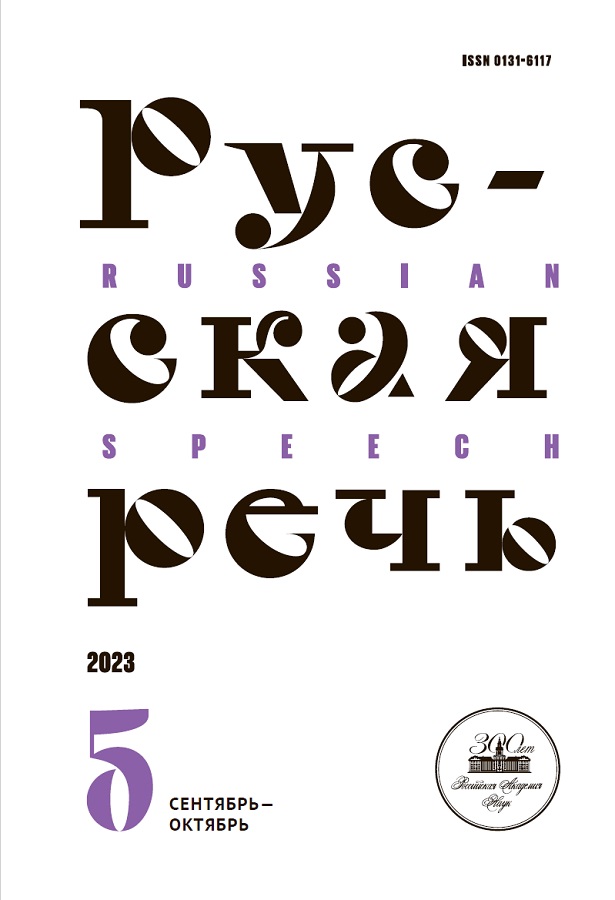Pragmatic Category of Person in the Theory of Personal Names
- Autores: Krongauz M.A.1
-
Afiliações:
- National Research University “Higher School of Economics”
- Edição: Nº 5 (2023)
- Páginas: 19-31
- Seção: Articles
- URL: https://clinpractice.ru/0131-6117/article/view/652346
- DOI: https://doi.org/10.31857/S013161170028364-9
- ID: 652346
Texto integral
Resumo
The article substantiates the introduction of pragmatic category of person to describe the functioning of personal names. The first person is used for self-representation, the second person for addressing, whereas the third one is connected to all other uses, which are conventionally designated as referential. The category of person is a certain pragmatic position in an utterance associated with a speaker, an addressee, or with something / someone that is neither one nor the other. The article proposes that it is the second person (addressing) that can be considered a strong position in which the maximum set of options is possible. There are certain restrictions for the first and third person, for example, it is not recommended to use affectionate and other emotional variants of names: Andryushechka, Sashulenka, Verunchik, etc. The emphasis on the second person is explained by the fact that addressing is a communicative point at which relations are established between the interlocutors: the speaker offers them, and the addressee can correct them. Options that tend to be used exclusively in the second person should be classified as colloquial speech. Thus, the use of the category of person for personal names makes it possible to conveniently formulate the rules for choosing a variant of a name, along with a meaningful interpretation.
Palavras-chave
Sobre autores
Maxim Krongauz
National Research University “Higher School of Economics”Russian Federation, Moscow
Bibliografia
- Бондалетов В. Д., Данилина К. Ф. Средства выражения эмоционально-экспрессивных оттенков в русских личных именах // Антропонимика. Под ред. В. А. Никонова и А. В. Суперанской. М.: Наука, 1970. С. 194–200.
- Вежбицкая А. Язык. Культура. Познание / Отв. ред. и сост. М. А. Кронгауз; вступ. статья Е. В. Падучевой. М.: Русские словари, 1996. 411 с.
- Википедия: свободная энциклопедия [Электронный ресурс]. URL: https://ru.wikipedia.org/wiki/
- Есперсен О. Философия грамматики. М.: Издательство иностранной литературы, 1958. 404 c.
- Кларк Г. Г., Карлсон Т. Б. Слушающие и речевой акт // Новое в зарубежной лингвистике. Вып. 17. Теория речевых актов. М.: Прогресс, 1986. С. 270–321.
- Кронгауз М. А. «Воплощенное» и «невоплощенное» имя собственное: некоторые аспекты референции // Экспериментальные методы в психолингвистике. М.: Наука, 1987. С.118–135.
- Кронгауз М. А., Пиперски А. Ч., Тиллабаева А. А. Употребление полных и кратких форм русских личных имен: количественные методы исследования // Слово.ру: балтийский акцент. 2020. Т. 11, № 4. С. 80–90.
- Кругосвет: универсальная научно-популярная энциклопедия [Электронный ресурс]. URL: https://www.krugosvet.ru
- Куно С., Кабураки Э. Эмпатия и синтаксис // Общественные науки за рубежом. РЖ. Сер. 6. Языкознание. М., 1979. № 2. С. 154–156.
- Лингвистический энциклопедический словарь / Науч.-ред. совет изд-ва «Сов. энцикл.», Ин-т языкознания АН СССР; Гл. ред. В. Н. Ярцева. М.: Сов. энцикл., 1990. 682 с.
- Национальный корпус русского языка [Электронный ресурс]. URL: https://ruscorpora.ru
- Петровский Н. А. Словарь русских личных имен: Ок. 2600 имен / Н. А. Петровский. 3-е изд., стер. М.: Русский язык, 1984. 384 с.
- Русская грамматика. Том 1. Фонетика. Фонология. Ударение. Интонация. Словообразование. Морфология / Академия наук СССР, Ин-т рус. яз.; гл. ред. Н. Ю. Шведова. М.: Наука, 1980. 783 с.
- Суперанская А. В. Структура имени собственного: фонология и морфология. М.: Наука, 1969. 207 с.
- Суперанская А. В. Словарь русских личных имен. М., 1998. 521 с.
- Суперанская А. В. Неофициальные формы русских личных имен // Русская речь. 2001. № 1. С. 84–88.
- Суслова А. В., Суперанская А. В. О русских именах. 3-е изд., испр. и доп. Ленинград: Лениздат, 1991. 219 с.
- Шмелев А. Д. Референциальные механизмы русского языка. Тампере, 1996.
- Clark H. Н., Carlson Th. В. Hearers and speech acts // Language, vol. 58, 1982, no. 2, pp. 332–371.
- Kuno S. Subject, theme, and the speaker's empathy // Subject and topic / C. N. Li (ed.). N. Y., Acad. Press, 1976, pp. 417–444.










